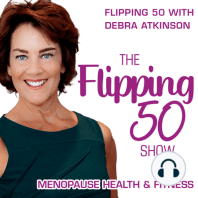35 min listen

Overdoing Exercise in Menopause: The Struggle to Scale Back
Overdoing Exercise in Menopause: The Struggle to Scale Back
ratings:
Length:
27 minutes
Released:
Apr 19, 2024
Format:
Podcast episode
Description
If this is you overdoing exercise in menopause, it’s very possible you might be saying that you love exercise so it’s not you. In this episode I’m going to talk about: Low dopamine receptors Addiction You see it in those recovered from drugs or taking a break from drugs only to become obsessed with exercise. It’s the similar phenomena. They want to feel good. The only time they do feel good might be when they’re at the gym or running depending on the activity of choice. For midlife women, exercise sometimes goes flat. The same exercise they use to do no longer gives that sense of high. The feel-good hormones aren’t released at the same level. It’s because there are fewer dopamine receptors. The very thing you’re doing, the discipline, the regular schedule that once was admired and possibly a source of pride and reason you were fit and envied, now can actually be causing exhaustion, loss of muscle and not just not working. It’s likely getting the opposite desired effect. You might just watch a friend, an inactive counterpart until now, start exercise and make beginner progress that leaves you envious. You wonder, why is this happening to me? And it’s almost like an addiction. You want to feel good, Overdoing exercise in menopause is about wanting to feel like your old self again, so in effort to “get back to how you used to feel” you try the exercise you used to do. That, friend, is going to backfire big time. The hardest thing for you to do, is the thing you must, and that’s stop working out so much. How to Stop Overdoing Exercise in Menopause That’s hard so here are a few suggestions. Kelly was a client back in the 90s. She worked full time and got up daily to work out beforehand. You might know her. Every gym has a Kelly. She was at the gym before it opened, waiting for the employee to arrive unlock the doors and turn on the lights. But Kelly’s over-exercise in midlife (combined with undereating, too little recovery time) got her injured and unable to do anything but swim. In a University town with no less than 3 pools, Kelly couldn’t find one with hours to help her get her exercise “fix” in before work. So she got up at 4 to drive 30 minutes to a neighboring town, swim her lengthy workout at the Y there, and return in time to be at work at 8am. Janet, worked a shift at a hospital and still belonged to a gym in a neighboring town she used to live in. She would get up at 3am to drive 45 minutes (one way) to work out at the gym and still make it back in time for her early starting shift. She’d put in a full day and if it was light outside after work she would often walk 1-2 hours more even though she was on her feet all day. Erin was a pre-physical therapy student. She was as driven by her workouts as she was to succeed in school. She would workout for 1-2 hours every morning and again at the end of her school day, having a bagel and some tuna for lunch, but eating little else and rarely if ever taking a day off. She would get ready for school in the locker room, drying her hair in her underwear, little by little becoming so emaciated her ribs protruded from her chest and her pelvic bones from her hips. She still felt fat. While some of these situations might overlap eating disorders, they are also of an addictive nature. The drug of choice is exercise. The amount of exercise it takes has escalated to a point it is doing damage to the body but the brain no longer sees it or care. That’s not necessarily you, but we often get so lost in our own thoughts and believe whatever it is we’re thinking is true. While all that’s true is our belief of it. You don’t have to be at such an extreme to experience accelerated aging and negative effects on muscle mass. How to Give Up Overexercising in Menopause for the Results You Really Want The solution has got to be something to support the balancing of your hormones. Muscle is an endocrine organ. It can influence insulin, cortisol, growth hormone and testosterone. Of those, do you know wh
Released:
Apr 19, 2024
Format:
Podcast episode
Titles in the series (100)
Birthdays After 40 | Happy 60th Birthday: The birthdays after 40. Remember when birthdays were all slumber parties and phone-shaped cake? What are your thoughts on birthdays now? While we couldn’t wait to be older once, I’m curious how some of the birthdays now feel. First, there were 10... by The Flipping 50 Show